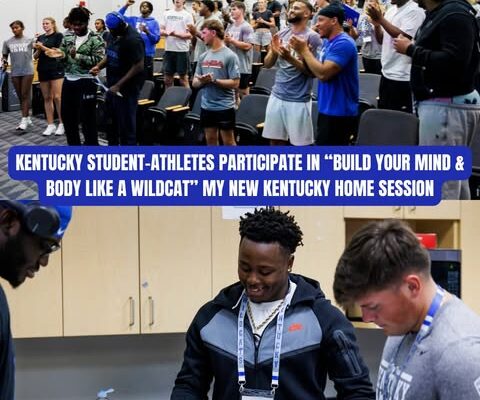This week, our transfer Cats and incoming freshmen had the unique opportunity to take part in an engaging and impactful session with Beyond Blue Zone, focusing on three vital pillars of well-being: recovery, nutrition, and mental health. In the high-performance world of college athletics and academics, these themes are not just buzzwords — they are the backbone of long-term success, personal growth, and team cohesion. For many of our new athletes, this experience marked a powerful starting point in their journey at our university, setting the tone for a season — and a college career — built not just on hard work, but on smart work, intentional living, and holistic wellness.
The session opened with an in-depth discussion on recovery, which quickly became an eye-opener for many of the students. Often in competitive environments, recovery is overlooked or seen as less important than pushing the body to its limits. But the team from Beyond Blue Zone made it clear: recovery is not a luxury, it’s a necessity. Recovery includes more than just rest days — it encompasses sleep quality, active recovery practices, hydration, mobility routines, and even mindfulness. The athletes were guided through why their bodies need structured downtime to grow stronger and avoid injury, and they were introduced to practices like foam rolling, dynamic stretching, contrast therapy, and guided breathing techniques.
One of the most valuable aspects of this part of the session was the emphasis on individualized recovery. What works for one athlete might not work for another, and learning to listen to one’s body is as critical as any training regimen. The Beyond Blue Zone team encouraged students to move away from the ‘grind culture’ mentality that glorifies exhaustion, and instead embrace a performance mindset that honors rest as an integral part of training. The group discussed common recovery myths, such as “no pain, no gain,” and replaced them with science-backed insights on how the body rebuilds during sleep, the importance of nervous system regulation, and how even 10 minutes of breath work or visualization can dramatically impact performance and recovery.
From there, the conversation shifted into nutrition — a topic that sparked plenty of questions and curiosity. For many student-athletes, nutrition has long been associated with restrictive diets, protein shakes, or strict meal plans, often driven by outdated views or social media trends. But Beyond Blue Zone presented a refreshing, empowering approach that resonated with both the freshmen and transfers. Rather than prescribing one-size-fits-all diets, the facilitators focused on food as fuel — something that powers the brain, supports muscle repair, and keeps emotions and energy in balance.
They broke down the role of macronutrients — proteins, fats, and carbohydrates — in a way that was easy to understand and apply to daily life. Beyond that, they delved into micronutrients and hydration strategies, and how deficiencies can affect mood, sleep, focus, and recovery. Students were surprised to learn how even small changes, like increasing their intake of leafy greens, adding healthy fats, or spacing meals appropriately, could improve their energy and focus during practice or class. There was also a thoughtful discussion about eating mindfully, tuning in to hunger and fullness cues, and building a healthy relationship with food — especially in a campus setting where dining hall choices can sometimes feel overwhelming.
One standout moment came when one of the speakers challenged the group to think about their meals as tools for mental strength and emotional resilience. The idea that food choices can influence stress levels, concentration, and even decision-making in high-pressure situations was a new concept for many of the students. With concrete tips on pre- and post-workout fueling, hydration habits, and how to recover from under-eating or overtraining, the students left this portion of the session feeling not only informed, but empowered.
But perhaps the most emotionally resonant part of the day came with the deep dive into mental health. Transitioning into college life, whether as a freshman or transfer student, brings a host of changes: new environments, increased expectations, academic pressures, and social adjustments. Add in the demands of collegiate athletics, and the mental load can be overwhelming. Beyond Blue Zone approached the topic with sensitivity, openness, and compassion. The message was clear: mental health is not a weakness, it is a part of human health — just like physical or nutritional wellness.
The speakers created a safe space where athletes could explore their own mental wellness and begin to normalize conversations about stress, anxiety, pressure, and vulnerability. They were encouraged to break the stigma that sometimes surrounds mental health in sports — the idea that athletes must be tough at all times or handle stress silently. Through personal stories, research-backed strategies, and peer discussions, the group learned how to recognize the signs of mental strain in themselves and others, and what practical steps they can take to seek support.
There was a significant emphasis on proactive care — not waiting until burnout or crisis hits, but building daily habits that nurture mental health. Strategies like journaling, practicing gratitude, setting boundaries, and checking in with teammates or trusted adults were presented as realistic and impactful tools. The concept of “mental fitness” was introduced, reframing the idea of mental health from something to be managed only when it’s going wrong, to something that can be trained and strengthened every day — just like a muscle.
What made the session particularly powerful was the integration of all three pillars: recovery, nutrition, and mental health were not treated as separate silos, but as interconnected aspects of a well-rounded life. The athletes began to see how poor sleep could impact their mental clarity, how poor nutrition could affect their emotional regulation, and how chronic stress could delay physical recovery. This integrated approach helped them understand that optimal performance doesn’t come from focusing on just one area — it comes from caring for the whole self.
Throughout the session, there was an air of respect, camaraderie, and genuine curiosity. The transfer students brought their previous college experiences to the table, offering valuable insights and honest reflections on what had worked or not worked for them in the past. Meanwhile, the incoming freshmen soaked up the information with the enthusiasm and openness of those just starting out. Together, they formed a collective commitment to approach their college experience with a foundation built on care, balance, and intention.
Coaches and staff who observed the session noted a visible shift in energy — not just in terms of motivation, but in maturity. The students weren’t just excited to train hard or compete; they were thinking about how to sustain themselves through the ups and downs of the season, how to show up for each other, and how to advocate for their own needs. There was a growing sense of ownership over their health — physically, mentally, and emotionally.
Moving forward, the conversations sparked by this session are likely to continue throughout the semester. The concepts introduced will be woven into team meetings, one-on-one check-ins, and informal locker room talks. But perhaps more importantly, they will ripple out into the daily choices our student-athletes make — whether that’s prioritizing sleep, asking for help when overwhelmed, choosing nourishing meals, or taking five minutes to breathe between classes and practice.
The partnership with Beyond Blue Zone has already proven to be more than just a guest lecture or orientation add-on. It’s a meaningful investment in our athletes as whole people, not just performers. And for the incoming class of Wildcats, this message couldn’t come at a better time. They are entering an environment that values more than their stats or times — it values who they are as teammates, students, and young adults learning to thrive in a fast-paced world.
As the week came to a close, the conversations didn’t stop when the session ended. Groups lingered, asking follow-up questions, sharing their own routines, and making plans to integrate what they learned into their training and student life. Some signed up for wellness follow-ups, others downloaded apps recommended during the session, and a few even started group chats to hold each other accountable for their hydration and sleep goals.
It’s easy to get caught up in the day-to-day hustle of college life — practice, classes, exams, games. But moments like this remind us that success is not just about showing up; it’s about showing up *well*. By taking time this week to reflect on recovery, nutrition, and mental health, our Wildcats aren’t just preparing for their next practice or their first game — they’re preparing for a balanced, fulfilling, and sustainable college experience. And that’s a win in every sense of the word.



